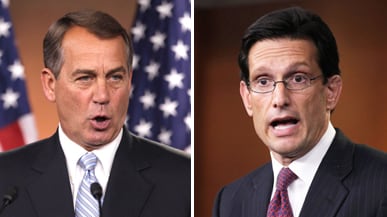Tag team or palace coup? That’s the burning question about the relationship between House Speaker John Boehner and his top lieutenant, Majority Leader Eric Cantor, after a week in which the two men pursued sharply different approaches to the budget battles that consumed and practically paralyzed Washington.
In one corner is Boehner, the knowing elder statesman and emissary to the White House for his newly empowered Republican caucus. In addition to convincing the GOP’s hungry base that he’s taking the fight to the Democrats, the Ohio veteran must juggle the more demanding job of convincing Americans that he can be trusted to put the needs of the country ahead of the demands of his party.
“We’re salivating at the next round, which could be Cantor coup-ing Boehner if he makes the wrong choice,” a senior Democrat said.

In the other corner is Cantor, bold, uncompromising and insistent at nearly every opportunity that the most conservative GOP proposal on the table is the only satisfactory outcome in this and every future budget battle. Unlike Boehner, the gentleman from Virginia has just one audience—the GOP caucus that made him the second-in-command and has made no secret of its desire to wring money out of the federal government until the unwieldy beast has been starved and the nation’s books have been balanced.
At no time were the men’s differences more vividly display than Thursday, when Boehner stood before the microphones outside the White House to declare that progress toward a compromise budget was being made and that any disagreements in the talks were happening between people who—wait for it—don’t hate each other.
“While these are very difficult negotiations,” Boehner said calmly, “you should understand that they're being conducted with people in the room who actually get along with each and like each other, which I think will help the overall process.” Almost simultaneously, Cantor, one of the self-described “Young Guns” (and co-author of a book by that name that mentioned Boehner only three times) was holding court on the House floor, sparring with Steny Hoyer. The Democratic whip was pushing to keep the government running at current spending levels while Boehner, President Obama and Senate Majority Leader Harry Reid hammered out the last of their disagreements on this year’s continuing resolution.
"I would say to the gentleman, no," Cantor said loudly. "We don't accept the status quo."
Like a right-of-center Rocky movie, the GOP members sitting around Cantor erupted into applause and stood to cheer their hero, begging the question for anyone watching: Whose side are they on?
Some congressional staffers and people who have watched the Boehner-Cantor relationship for years say the leaders might have divided up the duties this week of good cop and bad cop in a drama that requires more than one player. More likely, they say, the budget battle is bringing to the surface a friction that has been growing for years.
“There’s a palpable tension there that I think anyone can see,” a Democratic leadership aide says.
But Republicans who know Boehner and Cantor insist that every speaker-majority leader combination is destined to include some amount of head-butting, and that the Boehner-Cantor dynamic is far less toxic than duos before them.
“If you look at the Nancy Pelosi-Steny Hoyer relationship, that was a much more poisonous dynamic than anything you can imagine between Boehner and Cantor,” a former Boehner staffer says. “Hoyer was her No. 2 after she ran John Murtha against him and tried to deny him that leadership spot.”
And it’s true that the top dogs in the House have often barked at, and even bitten, their own. When Newt Gingrich served as speaker, the second- and third-in-command, Dick Armey and Tom DeLay, made no attempt to hide their disdain for each other. Gingrich eventually cut his losses and left the House under pressure after a politically bruising impeachment battle made him so ripe for fratricide that he had no choice but to leave or go out in disgrace. But unlike recent speakers before him, Boehner sits atop a caucus with dozens of freshmen who came to Washington pledging to speak truth to power, not to enable it.
His troops also include at least two conservatives, Mike Pence and Michele Bachmann, itching to raise their profiles for a possible run at higher office, as well as rising stars like Jim Jordan and Paul Ryan, whose bold proposals risk putting even the conservative Boehner to the left of his right-running members.
It’s a dynamic that could open the door for an ambitious comer like Cantor to waltz through if the Republican rank-and-file stop seeing Boehner as part of the solution toward getting a smaller, less costly government—and instead view him as part of the problem.
Boehner’s first test is the current budget debate, where he’ll be damned if it fails to appease Tea Party activists, who are reminding their members that Boehner and his team promised to cut $100 billion from this year’s budget in his “Pledge to America”—but possibly doomed if a government shutdown drags down his party’s fortunes along with it.
Republican staffers who know Cantor insist he is not planning ahead for Boehner’s demise and point to his record as a team player to prove it. But the palace intrigue alone seems to give even chronically depressed Democratic lawmakers something to smile about.
“We’re salivating at the next round, which could be Cantor coup-ing Boehner if he makes the wrong choice on the C.R.,” a senior Democrat said. Norm Ornstein, a congressional scholar at the American Enterprise Institute, says the story is nothing short of Shakespearean.
"The majority leader is whispering in the speaker's ear—‘I'll have your back’—while standing there with a dirk in hand," he said. For the non-English majors among you, “dirk” is the Shakespearean term for dagger.
Patricia Murphy is a writer in Washington, D.C., where she covers Congress and politics.






